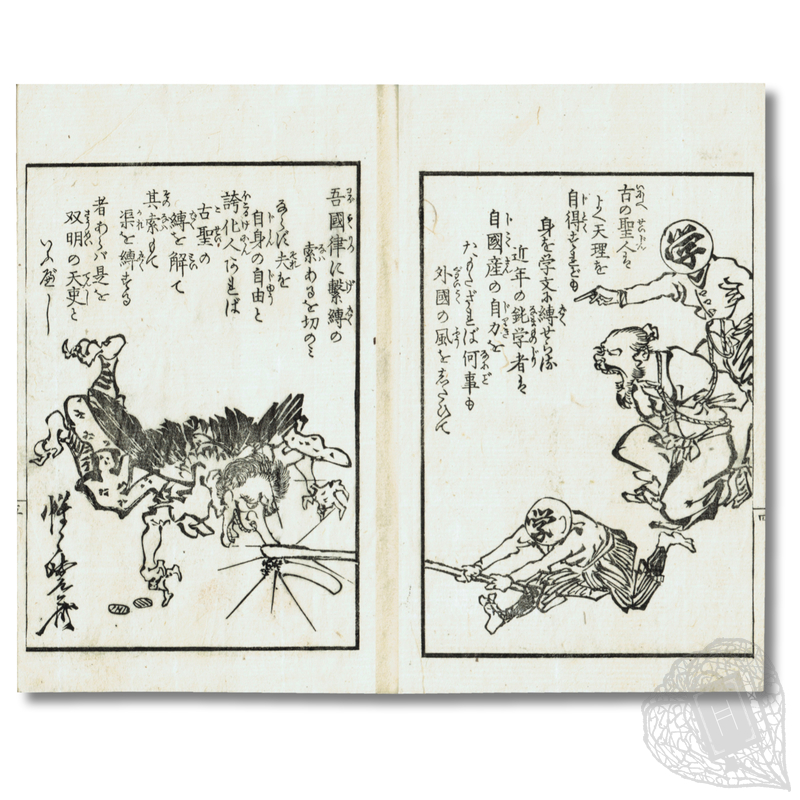Classic Illustrated Books Modern Art and Design Books Translations of Western Texts Japanese Literature Prints and Ephemera Western Books Photo Books Paintings & Scrolls Australia & New Zealand Others
Australia New Zealand Antarctica Japan Korea China Other
Edo Period [1603-1853] Bakumatsu Period [1853-1868] Meiji Period [1868-1912] Taishō Period [1912-1926] Shōwa Period [1926-1989]
Share this book on...

Tanemaki Gonbē no Atotsugi: Tarobē Mizukakeron (Tarobē the Waterer, Successor of Gonbē the Sower)
| US$1,750.00 |  ENQUIRE ENQUIRE |
 BUY BUY |
Tanemaki Gonbē no Atotsugi: Tarobē Mizukakeron ["Tarobē the Waterer, Successor of Gonbē the Sower"]
Hattori [Mantei], Ōga [text by]; Seisei [Kawanabe], Kyōsai [illustrated by].
Tōkyō: Yamazakiya Seishichi ... [et al.], Meiji 7 [1874].
The middle fascicle of a three-issue parody of a family history produced by Ōga and Kyōsai - Gonbē Tanemakiron ("Gonbē the Sower"), Tarobē Mizukakeron ("Tarobē the Waterer"), and Magobē Kakkeiron ("Magobē the Manager"). The words tanemaki (sowing seeds), mizukake (pouring water over), and kakkei (making a living) all have secondary meanings that make the titles humorous. Tarobē Mizukakeron, for example, can be translated as Tarobē the Waterer or The Fruitless Dispute of Tarobē (as mizukakeron also means "an endless (and meaningless) dispute"). The central idea of the stories was similar - a reliance on Western teachings leads to ruin. This fascicle, about the overly academic Tarobē, the eldest son of Tanemaki Gonbē, includes an engaging double-page scene by Kyōsai featuring a character exhibiting the physical characteristics of a Punch-like character and a tengu (long-nosed mythological being). This Punch-tengu crossover character was extremely popular in the Meiji period, presumably because both characters had long noses and the Punch character could be used to represent foreigners (who were also considered to have large noses and whose presence in Japan increased exponentially in the Meiji period). Ōga's satirical 'family history' series is sometimes referred to as the Sanbē trilogy.
One karitoji-bound volume, complete, on double leaves, traditional East Asian binding style (fukurotoji). Original wrappers lightly creased, with one ink stain. Previous binding holes present. Ex-ownership seals to upper wrapper and first page of text. A few small marks and creases internally. 8 leaves. 22.2 x 15.3 cm.
# 240203-14


• Ask a question about this item >
Classic Illustrated Books Modern Art and Design Books Translations of Western Texts Japanese Literature Prints and Ephemera Western Books Photo Books Paintings & Scrolls Australia & New Zealand Others
Australia New Zealand Antarctica Japan Korea China Other
Edo Period [1603-1853] Bakumatsu Period [1853-1868] Meiji Period [1868-1912] Taishō Period [1912-1926] Shōwa Period [1926-1989]
Share this book on...












